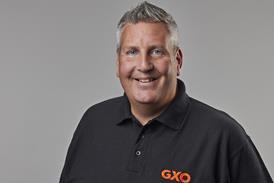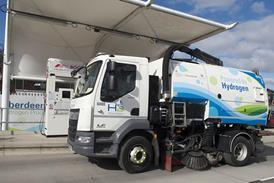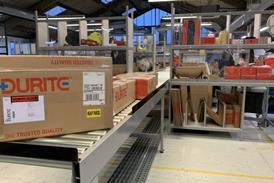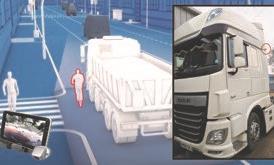John Granby, director of e-Truck and e-Van at EO Charging, has worked in the automotive sector for over 25 years, including spells with Scania and MAN Truck & Bus. Prior to joining EO in 2021, he led the development of Tevva’s hydrogen electric trucks across the UK. Here he tells MT how EO can support operators on their journey to net zero and why he’s now backing battery electric over hydrogen…
There are still many reasons why HGV operators aren’t willing to invest in zero carbon trucks - capital cost being the obvious one. How do you see it?
The cost of an electric truck is prohibitive, but some are getting round that by contract hiring with full maintenance. It takes away the residual risk and reduces the cost. One OEM offers a 50% buy-back after three years and a 30% buy-back after five years. You’re then only funding £150,000 on the £300,000 cost of an electric truck, which is only £30,000 more than a diesel. And they don’t want to buy back diesel because they’re rapidly approaching the time when they won’t be worth anything. So that’s one way of getting round the capital cost.
Tell us more about EO Charging and how they can help operators save money?
EO Charging provides innovative, user-friendly ways to support operators in their transition to electric fleets. We launched 10 years ago and now work with the likes of Amazon, DHL and UPS, as well as supermarkets such as Tesco, Sainsbury’s and Ocado.
To get round the infrastructure cost we bolt onto that a charging as a service model. That will amortise the cost of the infrastructure over 5, 10 or 15 years, probably 15 to make it much more affordable. The manufacturers I’ve spoken to really like the contract hire idea, and leasing companies really like it because it ties that customer to them through multiple vehicle changes. That’s the way forward and it makes it much more affordable for the customer. Going electric is a big operational and cultural shift, but if they know they have a service with someone who can come in and support them what really is the change from diesel?
How’s business going for you?
It’s good. A lot of interest is coming through the OEMs because they’re interfacing with the ultimate customers. They want a reliable charge-time provider to buddy up with. So we’re with all the main OEMs and they’re passing leads to us.
Can we expect electric truck prices to come down in the same way they have with buses?
All the OEMs have got electric truck production lines. Once that production line stops pumping out trucks because they’re not selling they’ll drop the price. Technology works like that; look at how the calculator and television have evolved.
If you want to make a comparison with buses, we’ve just done a project in that sector where the total project cost was £6m and £4m was government grants. That sector is seen as a public service but trucks and vans aren’t. That’s not fair; the money is there, they’re just not allocating it properly.
How can the government give HGV operators more confidence to invest in zero carbon trucks?
First there needs to be a public charging infrastructure which needs to be funded. I’m not saying they have to pay for it, but give grants to the people installing it.
Secondly they need to up their game with grants towards electric trucks because they’re two or possibly three times more expensive. Look at Germany, Ireland or other European countries - their government funds 80% of the difference between diesel and electric. So it makes it far more palatable to the customer if they’re only going to pay a 20% increase. That would be a great incentive.
We also need certainty on the cut-off date for diesel. DAF, Volvo, Mercedes Benz, HVS, Volta… all of them have set out production lines for 2030 and 2035, but now we’re talking about maybe 2040. You can’t do that. If the government want people to step up to the plate they’re going to have to invest in infrastructure, improve grants and be firm on dates.
Is range anxiety easing as battery technology develops?
I used to sell electric trucks and the big obstacles were price and range, but range is no longer an obstacle. Daimler now have a truck with a 500-mile range. That’s two work breaks in a day. What driver drives more than that in a day? They don’t. They’ve got to stop after four-and-a-half hours so as long as there’s a charging point while they’re having their break they’re ok. The government needs to look at that. At the moment as an HGV driver if I plug in my truck I’m not on my break. Current legislation means I’m still working which is ridiculous. As it is, there has to be an old-fashioned attendant to plug the truck in for them which is ludicrous. There are lots of little things that don’t make sense, they’re antiquated.
Are the government’s decarbonisation deadlines unworkable?
Unless there’s a huge shift in government policy yes. Some more funding will become available, it has to be, but there will be a huge gap between the big companies and the SME’s, and small businesses are a massive part of our economy. We urge the new government to look at the importance of grants and look at what’s been done with the bus sector.
Where does hydrogen fit into all this?
I came from Tevva hydrogen. Think of the size of the UK, there’s really no need to have hydrogen. Every driver has to stop every 250km, so as long there’s a charging infrastructure most trucks will go way beyond that on an electric charge. Hydrogen is designed for long-range, long-haul bulk transport. It’s insanely expensive, there’s no infrastructure, there’s four hydrogen refuelling stations in the UK. The only country geared up slightly towards hydrogen is Germany which has 90 refuelling stations. In mainland Europe and the US you could make the case for hydrogen because of the distance, but most of the fleets we’re dealing with are last-mile and middle-mile delivery so the ranges on the trucks can be accommodated by electric.
Having switched from hydrogen to electric you would say that though wouldn’t you?
No, I just think the amount of electricity needed to produce hydrogen means it isn’t a green option. I’m not sure hydrogen will become a tour de force in America either. Battery tech is improving, they’re getting longer range and lighter. Why do you think I’ve come to EO?
There isn’t enough green hydrogen to supply the filling stations and we could be 15 years away from having enough unless they import from Saudi Arabia, but that will create its own problems. Whichever way you look at it there’s problems for hydrogen.
But big truck makers like MAN are already producing hydrogen trucks…
They can do that in Germany, there’s an infrastructure, but I think it’s too expensive. You’re talking about £12 a litre for hydrogen. Who’s going to pay that?
Are HGV operators fully aware of how hydrogen works? What do they need to know?
A hydrogen fuel cells runs on gas and that’s the cheapest way of running a truck because that’s an electric truck which needs an electric charge point. You have gas cylinders which feed through the hydrogen fuel cell. That generates electricity and charges the truck battery. The fuel cell doesn’t charge the truck, it charges the battery so it’s still an electric truck.
The other option is a hydrogen combustion engine which is a liquid. Combustion is insanely expensive to produce and the CO2 emissions are colossal. We’re supposed to be going green. I don’t see that being the solution.
Should the government be incentivising HVO?
It’s not the long-term solution. The price varies substantially and it you’re in a very low margin business where the margin is 2-3% you can’t afford to take the risk. The only people who really take it on are the huge fleets like DHL and GXO.
Would a second-hand market for electric trucks help?
The market isn’t mature enough but in the next five or 10 years that would be helpful.
I used to be head of UK used trucks at Scania so I’m very au fait with residual value. First, there aren’t that many electric trucks in the marketplace. We don’t know what the residual value is going to be, we don’t know what the battery life is going to be. That’s why people are contract hiring to take away the battery and residual value risk. That means the OEMs are setting the benchmark now. They will decide what that starting price is going to be. But I do agree with the RHA that we need a second-hand market. You might buy a new Scania for £120,000 but if you buy a four-year-old one it might only be 30 grand. If electric vehicles depreciate in the same fashion – even with Scania which has bullet proof residuals – then it’s going to make the electric marketplace a lot more accessible. That takes me back to my first point – we need more trucks on the road so the government need to incentivise.
What do you make of the government’s Zero Emission HGV and Infrastructure Demonstrator (ZEHID) trial?
We’ve got involved with DAF, Volvo and Renault as a result and we’re dealing with some of their customers who’ve come from the trial. It’s great and they need to do more of this.
What’s your view on firms like Vertellus who hire out charging equipment so firms can trial electric trucks?
That’s ok with cars but if you’re running a fleet like Amazon, DPD or DHL, if a charger goes down your physical delivery will be missed. Our service level agreement is in excess of 99.5 charge time assurance. If we didn’t hit that we’d get big penalties from those firms. People need to get their charging infrastructure in first or it won’t work.
Realistically, will many operators buy another fleet of diesel trucks just before the deadline to avoid the transition for as long as possible?
Yes, but there’s myriad reasons why they’ll have to change. The biggest one is that their customers will demand that they change. Amazon is one of them - they have end customers who use it because of what it stands for. DPD, DHL, UPS, Tesco, Sainsbury’s… they’ve all got customers, especially from the younger generation, who are very conscious of the environment and want to buy from customers who are being seen to do the right thing.
You’ll see companies having to report on their sustainability. Yes they will try to kick and fight, but the costs will come down, the pressure will go up and they’ll be left behind if they don’t make the change.









![Mercedes-Benz_eActros_600_(1)[1]](jpg/17820_mercedesbenz_eactros_600_11_978080.jpg)






